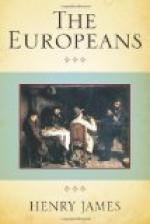“Ah,” said Acton, “but it was to come here, where I am!”
“I did n’t know of your existence. Excuse me for saying anything so rude; but, honestly speaking, I did not. No,” the Baroness pursued, “it was precisely not to see you—such people as you—that I came.”
“Such people as me?” cried Acton.
“I had a sort of longing to come into those natural relations which I knew I should find here. Over there I had only, as I may say, artificial relations. Don’t you see the difference?”
“The difference tells against me,” said Acton. “I suppose I am an artificial relation.”
“Conventional,” declared the Baroness; “very conventional.”
“Well, there is one way in which the relation of a lady and a gentleman may always become natural,” said Acton.
“You mean by their becoming lovers? That may be natural or not. And at any rate,” rejoined Eugenia, “nous n’en sommes pas la!”
They were not, as yet; but a little later, when she began to go with him to drive, it might almost have seemed that they were. He came for her several times, alone, in his high “wagon,” drawn by a pair of charming light-limbed horses. It was different, her having gone with Clifford Wentworth, who was her cousin, and so much younger. It was not to be imagined that she should have a flirtation with Clifford, who was a mere shame-faced boy, and whom a large section of Boston society supposed to be “engaged” to Lizzie Acton. Not, indeed, that it was to be conceived that the Baroness was a possible party to any flirtation whatever; for she was undoubtedly a married lady. It was generally known that her matrimonial condition was of the “morganatic” order; but in its natural aversion to suppose that this meant anything less than absolute wedlock, the conscience of the community took refuge in the belief that it implied something even more.
Acton wished her to think highly of American scenery, and he drove her to great distances, picking out the prettiest roads and the largest points of view. If we are good when we are contented, Eugenia’s virtues should now certainly have been uppermost; for she found a charm in the rapid movement through a wild country, and in a companion who from time to time made the vehicle dip, with a motion like a swallow’s flight, over roads of primitive construction, and who, as she felt, would do a great many things that she might ask him. Sometimes, for a couple of hours together, there were almost no houses; there were nothing but woods and rivers and lakes and horizons adorned with bright-looking mountains. It seemed to the Baroness very wild, as I have said, and lovely; but the impression added something to that sense of the enlargement of opportunity which had been born of her arrival in the New World.




